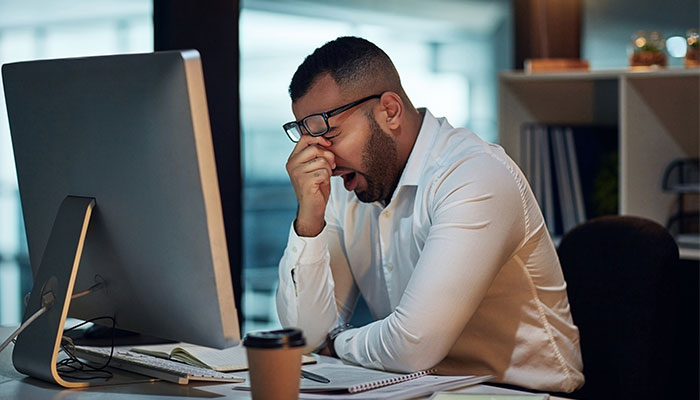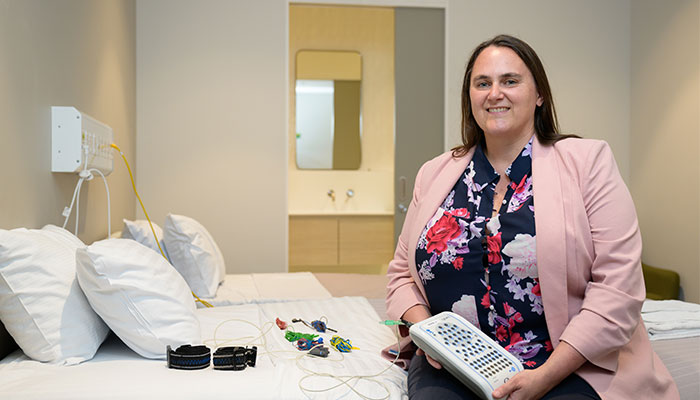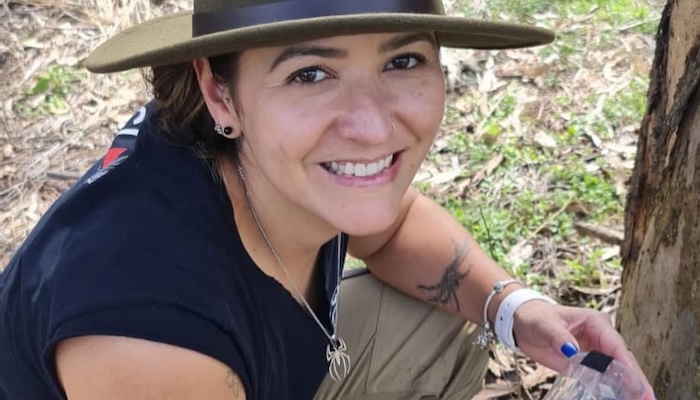Understanding the difference between sleepiness and fatigue is vital in diagnosing and treating the underlying causes of daytime sleepiness.

Fatigue is a feeling of sluggishness and a lack of energy, but it is not necessarily accompanied by the urge to sleep.
Sleepiness is the tendency to fall asleep, like dozing off on the couch or at your desk, or even in critical situations such as when you are driving. Yawning may be a sign of sleepiness, but not always.
Feeling sleepy may be due to natural dips in our circadian rhythm, which controls our sleep/wake cycle. One of these natural dips occurs about 3pm, leading many people to reach for a cup of coffee.
Stimulants may affect our ability to sleep at night, so a flat white shouldn’t be your go-to remedy. Getting enough sun in the morning helps, then when the slump hits, going for a short walk is a better way to combat the problem.
Some people are badly affected by daytime sleepiness. Causes may include sleep restriction due to having a young family or being a shift worker, the use of certain medications, or using drugs or alcohol.
Some medical conditions are also associated with sleepiness, including mood disorders such as depression, hyperthyroidism, anaemia, neurological disorders like Parkinson’s disease, brain injury, and even obesity. Hormonal changes, such as those experienced during menopause, can also disrupt sleep.
Overnight answers
Sleep disorders are a major cause of daytime sleepiness. Insomnia and obstructive sleep apnoea result in sleepiness because of disrupted sleep, but other conditions like narcolepsy can cause people to fall asleep without warning.
Narcolepsy is a rare neurological condition, affecting only about 25 to 50 people in 100,000.
Obstructive sleep apnoea is far more common, and is often associated with snoring and obesity. It involves brief periods where the patient stops breathing at night, restricting oxygen to the brain and usually resulting in daytime sleepiness.
Only a sleep physician can accurately diagnose a sleep disorder.
Probably the best-known diagnostic method is the sleep study. These are conducted overnight in a hospital or sleep lab, or sometimes at home, and involve being connected to sensors that measure heart rate, breathing, brain waves, muscle tone, eye movements and blood oxygen levels. Assessing daytime sleepiness requires other tests during the day.

Anyone with a wearable device such as a smartwatch or fitness tracker is probably familiar with its sleep data function. While these devices do provide some information, it comes from proxy measures based on heart rate and movement, and so they are not a reliable measure of sleep on their own.
With many different causes of daytime sleepiness, there are also a number of treatments. Often, these involve both lifestyle changes and medical interventions.
Lifestyle adjustments alone can be beneficial, such as improving your ‘sleep hygiene’ or undergoing cognitive behavioural therapy. Managing stress, reducing alcohol consumption, and checking medications can also combat daytime sleepiness.
Something as simple as a nap can be beneficial. Short naps of about 20 minutes are ideal, and can help you feel refreshed without causing grogginess, or affecting your nighttime sleep pattern.
If a sleep disorder is diagnosed, medical interventions may be appropriate, and these vary depending on the condition.
For sleep apnoea, a continuous positive airway pressure (CPAP) machine may be prescribed to prevent the airways from closing during sleep.
Ultimately, if you are experiencing severe daytime sleepiness that is interfering with your day-to-day activities, it is important to seek advice from a healthcare professional to find out the cause.
For conditions like narcolepsy, wakefulness promotors may be prescribed. Unlike amphetamines, which force the body to produce more dopamine, wakefulness promoters allow dopamine to remain active for longer by preventing it from being reabsorbed.
An emerging class of treatments is the orexin agonists. Orexin is a neurotransmitter that regulates the sleep/wake cycle, and studies have shown that people with narcolepsy are lacking orexin in their cerebrospinal fluid, which indicates their bodies are not producing it.
Orexin agonists bind to the brain’s orexin receptors, making the body think orexin is present, and they are showing promise in treating narcolepsy. We are currently involved in several clinical trials of orexin agonists at the Woolcock Institute of Medical Research, and the results so far are exciting.
Ultimately, if you are experiencing severe daytime sleepiness that is interfering with your day-to-day activities, it is important to seek advice from a healthcare professional to find out the cause.
As with many conditions, your GP is a good place to start, as they can provide advice and refer you to an appropriate clinician for evaluation and a tailored treatment plan.

Dr Julia Chapman, pictured, is a Postdoctoral Research Fellow at the Woolcock Institute of Medical Research and a Conjoint Lecturer at Macquarie University. The Woolcock, the leading respiratory and sleep research organisation in Australia, is a research partner of Macquarie University and is based on the Wallumattagal Campus.



